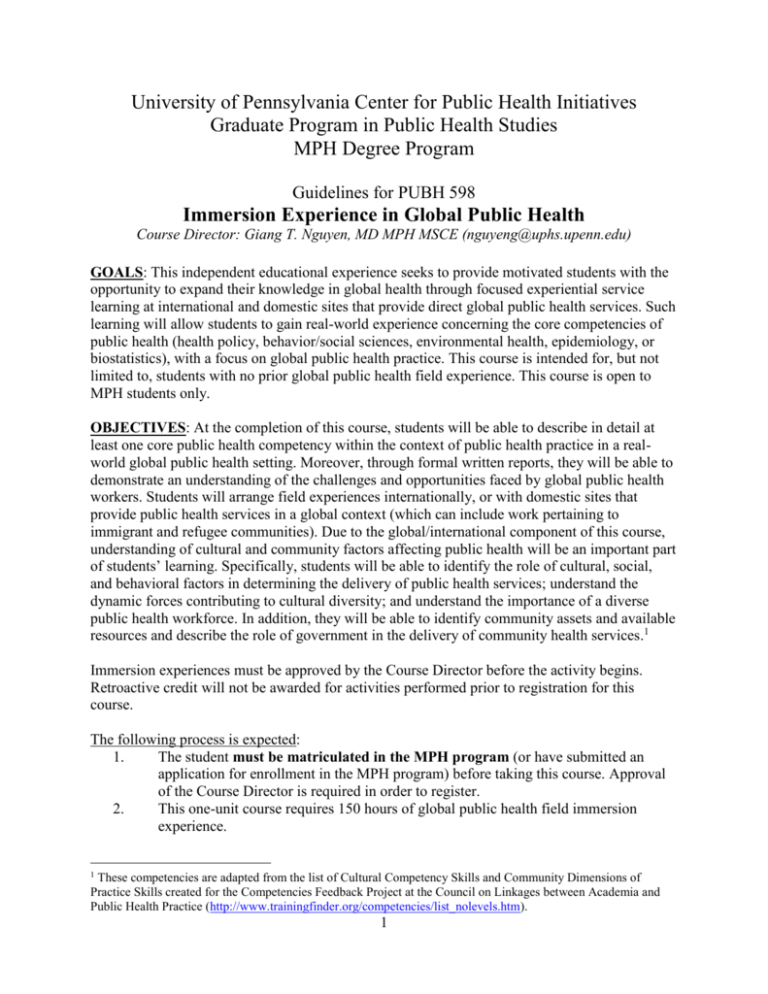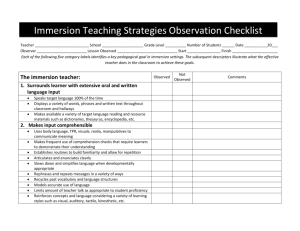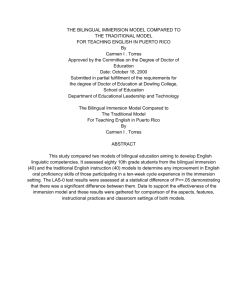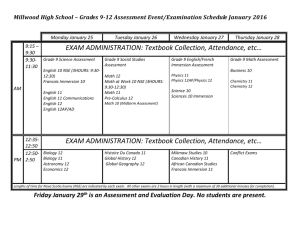University of Pennsylvania - Master of Public Health Program at the
advertisement

University of Pennsylvania Center for Public Health Initiatives Graduate Program in Public Health Studies MPH Degree Program Guidelines for PUBH 598 Immersion Experience in Global Public Health Course Director: Giang T. Nguyen, MD MPH MSCE (nguyeng@uphs.upenn.edu) GOALS: This independent educational experience seeks to provide motivated students with the opportunity to expand their knowledge in global health through focused experiential service learning at international and domestic sites that provide direct global public health services. Such learning will allow students to gain real-world experience concerning the core competencies of public health (health policy, behavior/social sciences, environmental health, epidemiology, or biostatistics), with a focus on global public health practice. This course is intended for, but not limited to, students with no prior global public health field experience. This course is open to MPH students only. OBJECTIVES: At the completion of this course, students will be able to describe in detail at least one core public health competency within the context of public health practice in a realworld global public health setting. Moreover, through formal written reports, they will be able to demonstrate an understanding of the challenges and opportunities faced by global public health workers. Students will arrange field experiences internationally, or with domestic sites that provide public health services in a global context (which can include work pertaining to immigrant and refugee communities). Due to the global/international component of this course, understanding of cultural and community factors affecting public health will be an important part of students’ learning. Specifically, students will be able to identify the role of cultural, social, and behavioral factors in determining the delivery of public health services; understand the dynamic forces contributing to cultural diversity; and understand the importance of a diverse public health workforce. In addition, they will be able to identify community assets and available resources and describe the role of government in the delivery of community health services.1 Immersion experiences must be approved by the Course Director before the activity begins. Retroactive credit will not be awarded for activities performed prior to registration for this course. The following process is expected: 1. The student must be matriculated in the MPH program (or have submitted an application for enrollment in the MPH program) before taking this course. Approval of the Course Director is required in order to register. 2. This one-unit course requires 150 hours of global public health field immersion experience. 1 These competencies are adapted from the list of Cultural Competency Skills and Community Dimensions of Practice Skills created for the Competencies Feedback Project at the Council on Linkages between Academia and Public Health Practice (http://www.trainingfinder.org/competencies/list_nolevels.htm). 1 3. Planning for this immersion experience must begin with a discussion with the Course Director prior to the beginning of the semester; to ensure that it is consistent with the student’s overall plan of study. Procedure: 1. Students are responsible for identifying potential immersion sites, contacting site supervisors, securing assurances that site supervisors and willing and able to work with the students, and obtaining any necessary funding for travel, housing and related expenses, as needed. 2. After selecting and conferring with an immersion experience field supervisor, the student will complete an Immersion Experience Proposal. (See Appendix). This proposal should include components of public health service/public health practice by the student. 3. The student will present the Immersion Experience Proposal to the Course Director who must approve it and forward to the MPH Program Office. The Course Director will oversee the conceptualization and evaluate the written products of the project. 4. A copy of the approved Proposal will be kept in the student’s file. 5. Students are responsible for assessing any potential health hazards associated with their travel by visiting www.cdc.gov/travel and consulting with their personal physicians as appropriate, for any necessary immunizations and prophylactic drugs. 6. All students enrolled in this course MUST register their planned time away on Penn’s Global Activities Registry, which maintains a database of Penn-related travel abroad and helps coordinate with International SOS. The Registry began as a cross-campus resource to contact travelers in emergencies, help them with regulations and preparations, and identify opportunities for collaborations. You can access the Registry at: http://www.upenn.edu/globalactivities [students doing global health activities at US-based sites do not need to register here]. Please print and submit a copy of your registration, or submit a PDF or JPG file of the confirmation page. 7. During the immersion, the student and the field supervisor must schedule regular meetings throughout the duration of the immersion experience. 8. A Project Summary is required and must be submitted to the Course Director at the conclusion of the term. Attached to the Project Summary should be an evaluation of the site where the immersion experience took place. (See Appendix). 9. At the end of the immersion experience, the student also is responsible for obtaining a signed Evaluation of the Student (completed by the field supervisor listed on the Immersion Experience Proposal), for submission to the Course Director. 10. The Course Director’s final evaluation will include the following: Evaluation of student fulfillment of learning objectives Evaluation of written work submitted by the student Summary of field supervisor’s student evaluation. Student’s final grade. 11. As with all MPH courses, students are also responsible for submitting a confidential course evaluation directly to the MPH Program Office. 2 Academic Integrity: Students are expected to adhere to the University’s Code of Academic Integrity. Care should be taken to avoid academic integrity violations, including: plagiarism, fabrication of information, and multiple submissions. Students who engage in any of these actions will be referred to the Office of Academic Integrity, which investigates and decides on sanctions in cases of academic dishonesty. See link for more information: http://www.upenn.edu/academicintegrity/index.html MPH Academic Standing Policy/Academic Probation: According to University policy, a graduate student must maintain a ‘B’ average or better to be considered in good academic standing. A student who does not meet the University policy of a ‘B’ /3.0 average will be reviewed by the MPH Program Director, the Associate Director and the Academic Progressions Committee. A student may be put on academic probation for a period of 1 semester to improve his/her overall average may be put on academic probation for a period of 1 semester to improve his/her overall average. Any course in which the student receives a grade below a B- will not be applied toward the Master of Public Health degree. The record of any student who receives an unsatisfactory grade (less than a ‘B-‘) in a course or who does not meet the University policy of a ‘B’ /3.0 average will be reviewed by the MPH Program Director, the Associate Director and the Academic Progressions Committee. A student may be put on academic probation for a period of 1 semester to improve his/her overall average Students may continue to take other courses during the probation period and the student must make arrangements with the course director to remediate any grades lower than a B-. These arrangements must be approved by the MPH Program Director with input from the Academic Progressions Committee as needed. Any student who is on academic probation for a period greater than 1 semester will be referred to the Academic Progressions Committee for review and recommendation. This committee is authorized to dismiss the student or allow the student to remain in the program on a probationary basis. A return to good academic standing is contingent on receiving an acceptable grade (B or higher) in all remaining courses. The MPH grading policy is at the discretion of the individual course instructors. Please find below the generally used grading scale for the MPH Program. A+ 97-100 B+ 87-89 C+ 77-79 A 93-96 B 83-86 C 73-76 A- 90-92 B- 80-82 C- 70-72 F 0-69 Please note that an A+ carries the same weight (4.0) as an A. Incomplete Grade: It is expected that a matriculated Master of Public Health student shall complete the work of a course during the semester in which that course is taken. A student who fails to complete a course within the prescribed period shall receive at the instructor’s discretion either a grade of I (incomplete) or F (failure). If the incomplete is given, the instructor may permit an extension of time up to one year for the completion of the course. In such cases, any course which is still incomplete after one calendar year from its official ending must remain as incomplete on the student’s record and shall not be credited toward the MPH degree. Students who receive two or more incompletes within a semester may not register for the subsequent semester(s) without the permission of the Department. For additional information on academic policies, please refer to the corresponding sections in the Student Handbook. 3 APPENDIX: Student CHECKLIST PUBH 598 Immersion Experience in Global Public Health Before immersion experience Reviewed proposal with Course Director Formal acknowledgement from site placement received and submitted to Course Director Proposal signed by Course Director Official registration completed with MPH office Review CDC travel advisories, complete any recommended medical visits, immunizations, etc. If traveling outside the USA, register with Penn’s Global Activities Registry and submit copy of documentation to Course Director During immersion experience Communicate with Course Director periodically during Let your site supervisor know that an evaluation must be completed by the site supervisor listed on your proposal before you leave. Take notes, refer to your proposal, and ensure that you are sticking to your learning plan. If you must deviate from the plan, document rationale and if possible discuss with Course Director during the process. Have your site supervisor complete the Evaluation of Student form before you leave. The form can be sealed in an envelope and signed by the site supervisor over the seal, OR the site supervisor can scan and email document image to the Course Director from an official organization email address. After the immersion experience Meet with the Course Director for a post-immersion interview. Submit Project Summary document according to instructions on the template. Make any edits as requested by the Course Director. Submit single-slide PowerPoint file describing the immersion experience, according to the instructions on the Project Summary template. Make any edits as requested by the Course Director. Complete and submit the Site Evaluation form. 4 APPENDIX: Templates for Required Documents PUBH 598 Immersion Experience in Global Public Health Immersion Experience PROPOSAL Student Name: Title of Proposed Global Public Health Immersion Experience: Semester and Year: Site Name and Address: Field Supervisor Name, Address, Phone, and E-mail: Statement of Learning Objectives. Please include specific explanation as to which public health core competency or competencies will be addressed by this experience (health policy, behavior/social sciences, environmental health, epidemiology, or biostatistics). Please describe your plan for meeting the learning objectives. Please attach a statement from the Field Supervisor indicating that your participation is approved and that the Field Supervisor will provide direct supervision of your activities (copy of e-mail or fax is acceptable). Signature of Student / Date: Approval Signature of Course Director / Date: 5 APPENDIX: Templates for Required Documents PUBH 598 Immersion Experience in Global Public Health – PROJECT SUMMARY Student Name: Title of Immersion Experience: Start and End Dates of Immersion: Site Name: Field Supervisor Name: 1. 2. 3. 4. 5. Describe the public health problem(s) addressed at your immersion site. Provide the rationale for the public health activities performed by the site. Describe your role in the public health activities. Discuss the public health challenges and opportunities observed during the immersion. Identify the role of cultural, social, and behavioral factors in determining the delivery of public health services at your immersion site. Also describe how these factors influence the way public health workers must communicate with local leaders and with community members in general. 6. Describe the dynamic forces contributing to cultural diversity at your immersion site. With this in mind, discuss the importance of a diverse public health workforce. 7. Identify the community assets and available resources affecting the delivery of community health services at your immersion site. Include a description and discussion of the cost of the services/activities performed at your site. 8. Describe the role of government in the delivery of community health services at your immersion site. What are the relevant laws pertaining to the health issues addressed by your site? 9. Describe of the impact of the immersion experience on your understanding of one or more of the public health core competencies (health policy, behavior/social sciences, environmental health, epidemiology, or biostatistics). 10. If this immersion was at a site in the USA, please indicate how this experience broadened your understanding of global health. Please be brief. Submit a PowerPoint file with a single slide describing your immersion experience. This exercise forces you to be concise in describing your immersion experience. It should include: - Your name, dates of your immersion, name of site, location of site, name of supervisor - A few bullet points describing what you specifically did and learned - Optional: photographs (ask for permission before taking anyone’s photograph) Submit the “Evaluation of Student” completed by the Field Supervisor who was listed in your proposal. This should be in a sealed envelope signed by the Field Supervisor. Be sure to get this before you leave your site. Please also attach the Site Evaluation, which you should complete. If the evaluation must be emailed, then it must be emailed from the site supervisor directly to me (giang.nguyen@uphs.upenn.edu), and the supervisor’s email address must indicate the organization’s Internet domain (e.g., “person@internationalprogram.org” is okay, but “person@comcast.net” is NOT okay). 6 APPENDIX: Templates for Required Documents PUBH 598 Immersion Experience in Global Public Health – SITE EVALUATION To be completed by the Student. Student Name: Title of Immersion Experience: Semester and Year: Site Name: Field Supervisor Name: Please let us know about your experiences at your Immersion Site: 1. Overall quality of the experience provided by the site with regard to your stated goals/objectives. 1 (poor) 2 3 4 5 (outstanding) 2. Level of direct supervision provided by the Field Supervisor. 1 (poor) 2 3 4 5 (outstanding) 3. Appropriateness of the site for future MPH students taking this Immersion Course. 1 (poor) 2 3 4 5 (outstanding) 4. Please provide additional comments that may be helpful for future students who choose to go to that particular site. Please submit this along with your Project Summary. 7 APPENDIX: Templates for Required Documents PUBH 598 Immersion Experience in Global Health – EVALUATION OF STUDENT Student Data Student Name: Semester and Year: Site Name: Supervisor Data Field Supervisor Name: Address (required): Phone Number (required): Email (if available): Student’s Activities and Accomplishments during this Immersion Experience: (The information above should be pre-filled by the student). To be completed by the international Field Supervisor. Thank you for taking the time to provide a valuable educational experience to this public health student. Experiences in the field provide important training to students as they prepare for careers in public health practice. Please provide your assessment of this student: 1. Did the student complete at least 150 hours of field experience (this may include time outside of your site during which students observed cultural and community characteristics pertinent to the global public health experience). Yes No (please explain) 2. Are activities and accomplishments described above accurate? Yes No (please explain) 3. Overall assessment of the student’s participation at your site. 1 (poor) 2 3 4 5 (outstanding) 4. Please provide any additional comments about the student’s participation, if applicable. Signature of Field Supervisor / Date: 8




